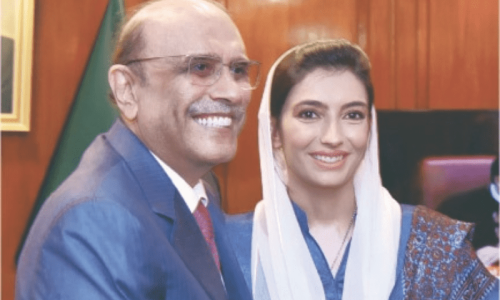WASHINGTON: Pakistan’s new ambassador, Dr Asad Majeed Khan, on Friday presented his credentials to US President Donald Trump at a ceremony held at the White House.
While presenting his credentials, the ambassador “expressed his deter to work hard towards fostering strong bilateral ties between Pakistan and the United States,” an embassy official told Dawn. He also highlighted the need to enhance “people to people contacts and trade and investment links,” the official added.
An embassy statement said the ambassador conveyed the greetings of Pakistan’s leadership to President Trump who “reciprocated with similar positive sentiments for Prime Minister Imran Khan”.
Recently, President Trump expressed the desire to explore opportunities for the two countries to work closely and renew their partnership. Mr Trump had previously accused Pakistan of harbouring terrorists and in 2018 he slashed US assistance to the country. But for months, he remained quiet on the issue. And in September, he sent Secretary of State Mike Pompeo to Islamabad, where he held meetings with PM Khan and others.
And then in his first cabinet meeting of the year, President Trump said he wanted to meet Pakistan’s new leadership in “not-too-distant future”.
Pakistan welcomed his remarks and said the government was keenly waiting for the engagement at the highest level.
One of his closest allies in Congress, Republican Senator Lindsey Graham, even offered a free trade deal to Pakistan if Islamabad persuaded the Taliban to participate in the US-backed Afghan peace process. “If we can go to Pakistan and put a free trade agreement on the table to get the Pakistanis to push the Taliban to the peace table, and you can end the Afghan war,” said the senator who often floats ideas that the administration wants debated.
In the same cabinet meeting, President Trump also sought greater roles for India, Russia and Pakistan in fighting the Afghan Taliban.
There also seems to be a realisation in Washington that the Trump administration’s coercive methods – such as suspension of US assistance and dictation to Islamabad to “do more” – were not working.
Pakistan has significantly reduced its dependence on the US economic and military aid by forging strategic partnerships with other world powers such as China. This and the need for peace settlement in Afghanistan seem to have created space for improvement in US-Pakistan ties.
Published in Dawn, January 13th, 2019















































Dear visitor, the comments section is undergoing an overhaul and will return soon.